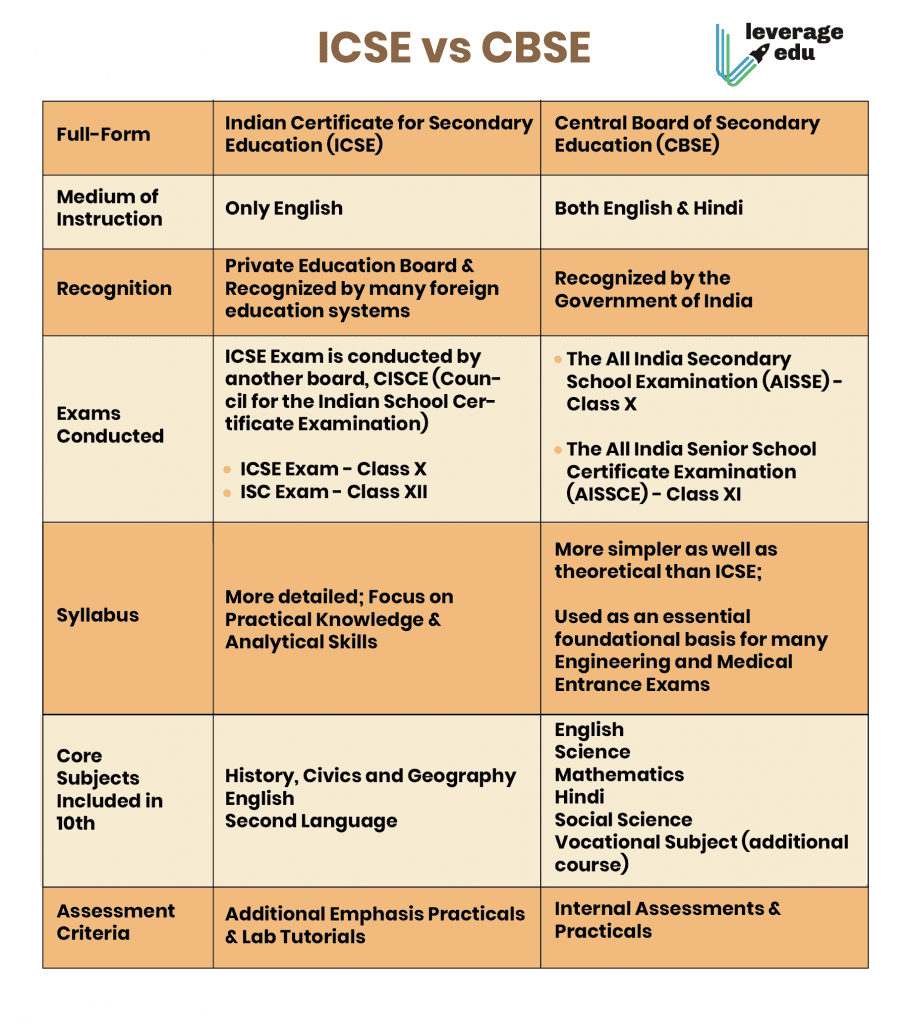While selecting an education board for your child’s academic journey, it is important to understand its features and the exposure it will provide your child. When it comes to the current education system of India, it is mainly classified into primary, secondary, and senior secondary levels. Moreover, the Indian Certificate of Secondary Education (ICSE) and the Central Board of Secondary Education (CBSE) are the two most recognised boards of education in India. While both ICSE and CBSE have their own distinctive features, you should be aware of the various characteristics of these two education boards in order to make an informed decision. So, here is an insightful blog on the battle of ICSE vs CBSE which will walk you through the functionalities, differences as well as several other criteria that sets them apart.
This Blog Includes:
ICSE vs CBSE: Differences
Before exploring these two education boards in detail, take a look at the following table elucidating upon the key differences between ICSE vs CBSE:

Basic Functionalities
The Central Board of Secondary Education (CBSE) is responsible for designing the syllabus for secondary and senior secondary levels of education in Indian. It is one of the most preferred boards which follows the national curriculum along with several additional subjects. Further, CBSE conducts two examinations: The All India Secondary School Examination (AISSE), and the All India Senior School Certificate Examination (AISSCE). This education board is also is recognised by the NCERT (National Council of Education and Research Training) with an aim to operate a chain of central schools that could provide transferable job opportunities to the government employees. CBSE syllabus is highly structured, predictable, and controlled and all national-level examinations are conducted as per the syllabus of this education board.
On the other side of the ICSE vs CBSE debate, the Indian Certificate of Secondary Education (ICSE) exam is conducted by the Council for the Indian School Certificate Examination (CISCE). The curriculum of the Cambridge IGCSE that existed during the British regime was taken over by the Anglo Indian Board and is now governed by the Council for the Indian School Certificate Examination. ICSE also comprises of similar syllabus patterns to CBSE at various levels. The 10th-grade examination in ICSE board is by far the toughest board examination. The syllabus of class 12th ISC is very detailed and difficult to crack.
Number of Affiliated Schools
There are many state and region wise schools which are affiliated to either CBSE or ICSE. While CBSE has more than 20,000 schools affiliated to it, ICSE has 2,000 plus schools.
Medium of Instruction
CBSE includes both English and Hindi language as the medium of instruction at all levels of education. However, ICSE does not recommend Hindi.
Board Recognition
CBSE is recognised by the Government of India while the ICSE is not. However, the educational certificates provided by these education boards are accepted globally. Yet, CBSE has a better acceptance level in the subcontinent than ICSE. Gradually, the Council for the Indian School Certificate Examination has been recognised by many foreign education systems.
ICSE vs CBSE: Regular and Private Candidates
CBSE is affiliated to a large number of public and private schools all over India. The board allows both regular and private candidates to pursue education in CBSE schools and allows private candidates from non-affiliated schools to appear in any CBSE examination. On the other hand, ICSE does not allow any candidate who has not studied in ICSE affiliated schools to appear for any examinations conducted by it.
Admission Process
Another prominent difference between ICSE vs CBSE is in their admission procedure. Talking about the admission criteria of CBSE schools, if your child is seeking admission at the beginning of schooling, some basic tests would be there which they need to qualify to be considered. Further, for getting admissions into class X or XII, No Objection Certificate (NOC) will be essentially required to be procured from your previous school. On the other hand, if you want admission into an ICSE school, the basic test is the main criteria but for those wanting to enter Class X or Class XII, they need to first get approval from the council through the principal of their previous school and then they will only get admission into a grade previous to their current grade, i.e. Class X aspirants will be admitted into Class IX while Class XII aspirants into Class XI.
ICSE vs CBSE: Syllabus
The syllabus prepared by CBSE is recommended to qualify the various competitive exams, including Medical and Engineering entrance exams. On the other hand, the syllabus of ICSE is more detailed and requires students to memorize a lot. CBSE is comparatively easier than ICSE. But the former focuses on testing the candidate’s scientific and mathematical knowledge along with an emphasis on application knowledge. ICSE keeps a balanced focus on Language, Science, and Arts.
Number of Subjects
When it comes to subjects under ICSE vs CBSE, the mandatory subjects for class Xth in ICSE affiliated schools are History, Civics and Geography, English, and a Second language. CBSE, on the other hand, has specified six subjects for class Xth, namely, Science, English, Mathematics, Hindi, Social Science, as well as a vocational subject. The common subject between ICSE vs CBSE board remains to be English only.
CBSE vs ICSE: Grading system
While CBSE offers an alphabetical list of grades, ICSE evaluates students in the form of scores. The number of students enrolled under CBSE for a particular academic session plays a vital role in deciding the grade a candidate will be awarded. ICSE calculates grades from 1 to 9, with 1 at the highest, with 9 at the lowest. But only grades 1 to 7 is shown on the certificates.
ICSE Grading System
| Grade | Standard |
| 1/ 2 | Very Good |
| 3/ 4/ 5 | Pass with Credit |
| 6/ 7 | Pass |
| 8/ 9 | Fail |
CBSE Grading System
| Grade | Grade Point | Marks Range |
| A1 | 10.0 | 91-100 |
| A2 | 9.0 | 81-90 |
| B1 | 8.0 | 71-80 |
| B2 | 7.0 | 61-70 |
| C1 | 6.0 | 51-60 |
| C2 | 5.0 | 41-50 |
| D | 4.0 | 33-40 |
| E1 & E2 | 0.0 | 21-32 |
ICSE vs CBSE: Assessment
In CBSE, internal assessments with practical tests are a vital part of the curriculum. In ICSE, the emphasis is placed on practicals and lab tutorials.
CBSE vs ICSE vs IGCSE
Now that you have understood CBSE vs ICSE in detail, let us go through the basic differences between CBSE, ICSE, and IGCSE boards.
- IGCSE stands for the International General Certificate of Secondary Education and is run by the Cambridge Assessment International Education [CAIE].
- While CBSE lays focus on Maths and Science, ICSE and IGCSE emphasis on Social Science, Humanities, Foreign Languages, etc.
- Without any compulsory subject combinations, in IGCSE schools, you can choose from a list of 70 subjects.
- Since the curriculum is formulated by the University of Cambridge itself, IGCSE is more complex than CBSE/ICSE.
- If you are aiming for pursuing higher education from academic institutes in India, CBSE is recommended. However, if you want to study abroad, then IGCSE/ICSE boards are more suitable.
Thus, we hope that this blog on ICSE vs CBSE helped you understand the major differences in these two boards. Both these Indian education boards are uniquely designed and are widely implemented by schools all across India. You can always reach out to our experts at Leverage Edu for any career-related guidance regarding your child’s future endeavours and we’ll help you make an informed decision that can benefit your child’s career aspirations.
-
Very clear information. I am shifting my son from ICSE to CBSE board in 6th std. Can he pursue his higher education in abroad after doing CBSE board studies ?

 One app for all your study abroad needs
One app for all your study abroad needs




















 25,000+ students realised their study abroad dream with us. Take the first step today.
25,000+ students realised their study abroad dream with us. Take the first step today.


1 comment
Very clear information. I am shifting my son from ICSE to CBSE board in 6th std. Can he pursue his higher education in abroad after doing CBSE board studies ?